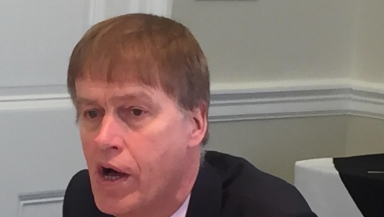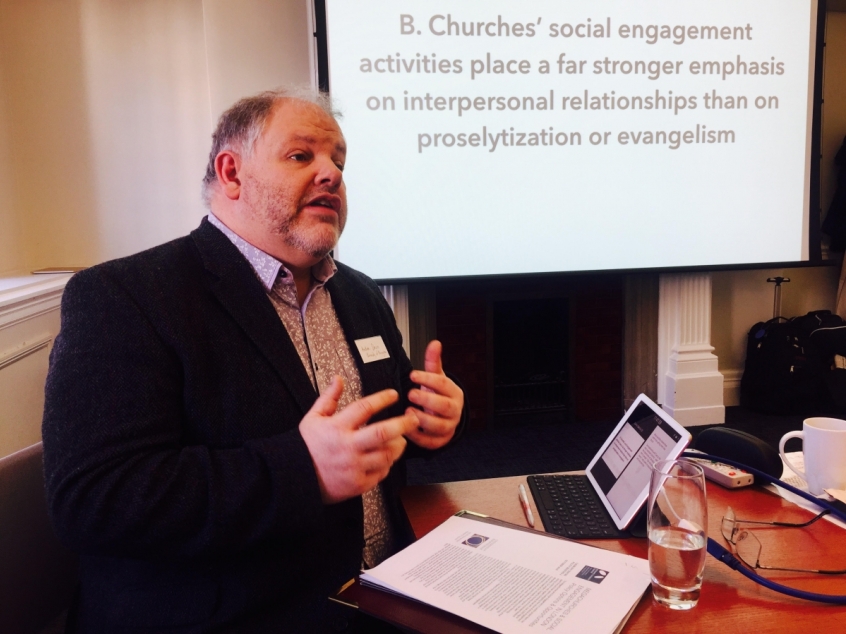
London's megachurches are thriving and most are growing in size, in spite of overall decline in churchgoing in the UK, because of their "deep and passionate commitment" to living out their relationship with God, a new report has found.
There are fewer than a dozen megachurches in England's capital but the biggest have more than 2,000 worshippers every Sunday. Some have thousands more than that.
Two Church of England churches, Holy Trinity Brompton, or HTB, and All Souls Langham Place are included in the megachurch report because they have more than 1,000 worshippers. Both are evangelical and HTB is home to the worldwide phenomenon of the Alpha Course.
The report says: "Megachurch leaders and members believe wholeheartedly in the existence of a God who wishes to engage with the world and see their reason for existence as being to testify to that world of God's existence by representing his presence."
Megachurches believe they are prospering "because of their deep and passionate commitment to prioritising what they see as a universal need for relationship with God above all other concerns," the report says.
The report, Megachurches and Social Engagement in London, is an initial policy document from research at the University of Birmingham aimed at investigating the contribution of these churches to London's spiritual and social well-being.
One key to their extraordinary success, the report suggests, is that God and not church membership is seen as the means of transforming lives.
Researchers looked at five case study megachurches: Kingsway International Christian Centre (KICC), New Wine Church (in Woolwich), Jesus House, Holy Trinity Brompton (HTB), and All Souls Langham Place. This study will be published soon.
They also identified other megachurches in London: Hillsong, Glory House, Ruach Ministries, Kensington Temple, Winner's Chapel, Victorious Pentecostal Assembly.
The biggest was KICC with 5,500 people. Ruach has 6,000 but this includes their Birmingham church. Holy Trinity Brompton has 4,500, Jesus House has 3,000, New Wine has 2,000 and All Souls has 2,300.
Launching the report, East Ham Labour MP Stephen Timms, who attends a Church of England parish with about 20 souls, said of megachurches: "They are remarkable phenomena."
Crucial to their appeal was the sense of "belonging" Timms said.
He added: "We are forever hearing reports of church attendance falling but in London church attendance is not declining it is going up. The Church of Engand is having to build its first new churches in london since the 1950s. My guess is we are going to see more and more of this growth going on outside london as well."
He described attending the Redeemed Christian Church Of God Festival of Life last weekend with 45,000 people, an all-night event
At the same event in Nigeria, a million people turn up.
The previous time he went, David Cameron was there for the Conservatives. The Labour leader had also been invited but Timms went on his behalf.
Timms said the 45,000 Christians were were delighted to have the Prime Minister there – and this might have had something to do with the fact that the Conservatives did so much better than Labour in the last election.

This time he went on behalf of Traidcraft and was given three minutes to speak. The church's Presiding bishop from Nigeria began speaking at midnight – and spoke for two and a half hours.
Timms said big churches in Newham in his constituence – not megachurches but of about 1,000 people such as Glory House – have a "significant" impact. They do things such organise health open days with the NHS. One of them was the first to operate a Trussell Trust food bank in the area
"My goodness what a difference they have made," he said.
"A lot of people in statutory services are inclined to think of megachurches and other religious institutions as inherently divisive."
In fact the opposite is the case.
One of the "significant contributions" they are making is "simply providing people a chance to belong."
Belonging to one of these churches gives people a sense of belonging to a wider community, he said. That contributes to the wider sense of cohesion.
Timms said the role of faith in Britain still not sufficiently recognised
"The assumption is that faith is on the way out. The reality is the opposite."

The report's co-author Dr Andrew Davies of the University of Birmingham, who grew up in an Assemblies of God church in the 1970s, said: "For these and many other large and growing British churches, Christianity is about relationship with God and is not reducible to a set of beliefs, rituals or values or to historic institutional culture."
He acknowledged recent figures showing decline in the Church of England but said there was also significant growth of completely new churchgoers, with 38,000 joining last year alone: "The people going to church now, go because they really believe in what they are doing."
He said he did not believe religion in Britain was under threat but it needed more recognition in public life.
"Christians believe that putting God into the picture is a fundamental part of the solution. One of the things we found quite remarkable about the megachurch approach is the breadth of offerings they have available."
Megachurches help people connect with others, often new arrivals to the city and to the country, and make friends. They also offer services in leadership, public speaking, food hygiene, teaching and many other areas. They can also help create an entrepreneurial culture in communities. However, they are not doing much to tackle "big" issues such as race and social justice, the report found.
Sarah Greenwood, London area manager for the Trussell Trust who looks after nearly 40 food banks, said megachurches could use their resources to do far more in terms of social action: "Although some of the megachurches do have foodbanks under their umbrella they are not carrying them forward, they are not very involved."













